
malkovru_esperanton_en - копия
.pdf
Word building
Any given Esperanto root will generate various words if you combine it with different prefixes, suffixes, and endings. As a result, you don't have to learn as much vocabulary as in other languages: prefixes and suffixes make it easy to create the words you need on the fly.
One approach is to juggle the endings:
interes' =>
intereso – an interest interesoj – interests interesa – interesting interese – interestingly
interesi – to interest someone
You can also create many new words from a single root by adding various prefixes (at the start) and suffixes (at the end). There are 10 prefixes and 32 suffixes in Esperanto. Here are some examples:
mal- denotes an opposite: bona – malbona (good – bad), juna – maljuna (young – old), fermi – malfermi (to close – to open)
-ej- denotes a place: lerni – lernejo (to learn – a school), loĝi – loĝejo (to reside – a home), vendi – vendejo (to sell – a shop)
-in- denotes a female: knabo – knabino (boy – girl), frato – fratino (brother – sister), viro – virino (man – woman)
-ul- denotes a person: juna – junulo (young – a young person), grava – gravulo (important – an important person), stulta – stultulo (stupid – a fool)
The system of affixes in Esperanto is one of Zamenhof's greatest inventions. John Wells, professor of phonetics
In his book Lingvistikaj aspektoj de Esperanto (Linguistic Aspects of Esperanto), Professor Wells draws a thought-provoking comparison between Esperanto and English. He imagines two students – one studying English and the other studying Esperanto
– who have to learn the word "eat", together with various other
words whose meanings are related. Esperanto's prefixes and suffixes (which the student has already memorized) make it an easy enough task to learn these words in Esperanto. But for the student of English, it's rather more difficult... Take a look:
In Esperanto |
In English |
manĝi |
to eat |
manĝas |
eats |
manĝis |
ate |
manĝos |
will eat |
manĝo |
a meal |
manĝaĵo |
food |
manĝado |
eating |
manĝejo |
dining room |
manĝujo |
trough |
manĝiloj |
cutlery |
manĝebla |
edible |
manĝinda |
good to eat |
manĝeti |
to nibble |
manĝegi |
to feast |
manĝaĉi |
to guzzle |
manĝema |
hungry |
manĝanto |
diner |
The Esperanto student doesn't take long at all to master the words listed above, because they're just the root manĝ- combined with various prefixes and suffixes and endings that the learner already knows. But the student of English has to work really hard to memorize the different words with their correct spellings and pronunciations. We could give similar examples for almost all the basic vocabulary that people need when they try to communicate with each other internationally. Perhaps you now have a clearer picture of why Esperanto is so much easier than a language like English for foreigners to learn.
Some Esperanto phrases
Saluton! – Hello!
Bonan tagon! – Good morning!, Good afternoon!
Kiel vi nomiĝas? – What's your name? Mia nomo estas ... – My name is ...
Kiel vi fartas? – How are you? Mi fartas bone. – I'm fine.
Kie vi loĝas? – Where do you live?
Mi loĝas en ... – I live in ...
Mi ĝojas renkonti vin. – I'm delighted to meet you.
Ankaŭ mi! – Same here!
Bonege! – Excellent!
If you'd like to listen to some spoken Esperanto, we recommend the website Radio Verda (www.radioverda.com) or the Esperanto broadcasts of Polish Radio (www.polskieradio.pl/eo).
language Esperanto the Introducing
Stano Marček's richly illustrated textbook Esperanto by direct method has been published in many languages. Find out about it at www.ikso.net/stano.marcek
A FASCINATING LANGUAGE 11
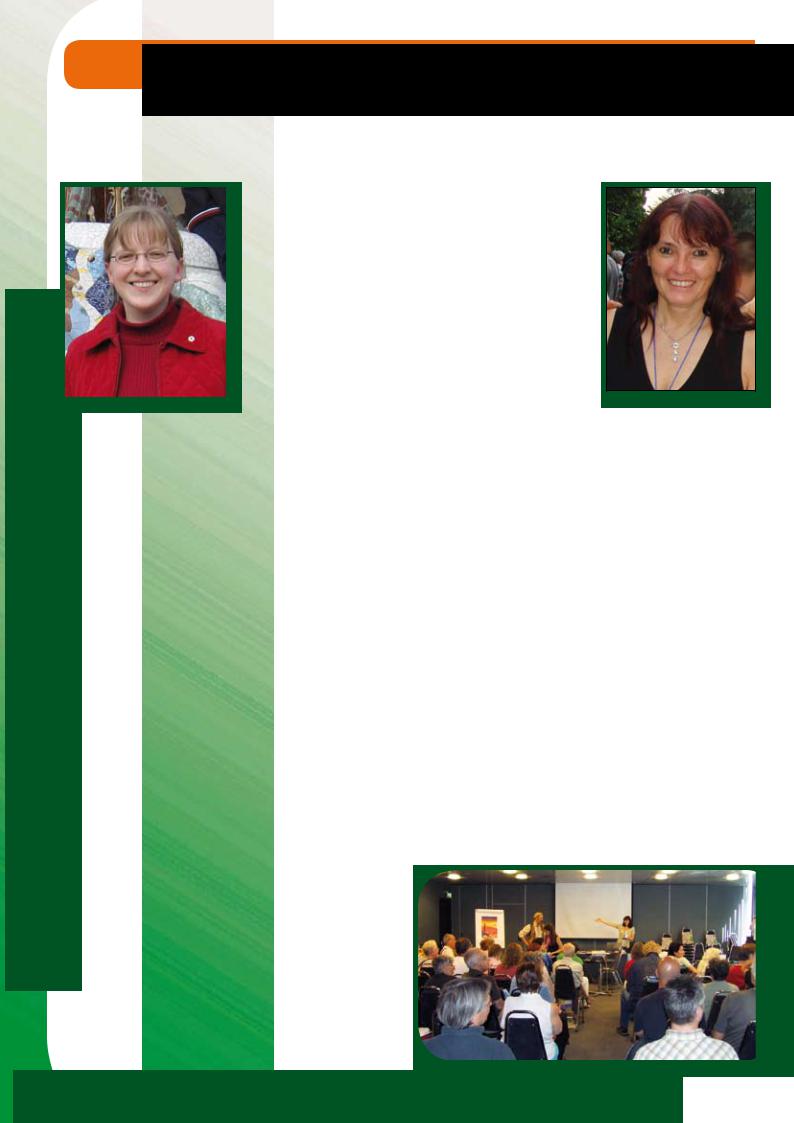
Personal stories about Esperanto
12
Personal stories about Esperanto
Here are some personal stories from people who regularly use Esperanto.
I FEEL PART OF A WORLDWIDE COMMUNITY
Name: Erin Piateski Country: United States
Profession:
Mechanical engineer
Esperanto activities include:
Member of the lernu.net team
II started learning Esperanto in high school, because I'd heard that Esperanto was an easy language, and so I thought Esperanto might be my only chance to speak a foreign language fluently. I found that friends and members of my family who had taken courses in a language could hardly ever speak that language, even at a basic level. So I studied Esperanto, hoping it would be my introduction to the world of foreign languages. At the time, I never imagined what I would later be able to do with the language: I just wanted to learn a foreign language, to be able to say that I
speak more than one language.
Despite this simple plan, Esperanto has become an important part of my life. I now have a boyfriend from abroad and I speak only Esperanto with him. In that sense, speaking Esperanto has become part of my daily activity – I don't just use it to talk with people in other countries, I also use it to discuss the weather, to debate recent politics, and to ask if there are enough eggs in the fridge to cook pancakes. But Esperanto has given me more than just a relationship: it has changed the way I see the world. It's often said that you can talk to people from every country in the world using English, and that's true. But not many people know that it's equally true for Esperanto. I've found that there are big differences between using English and Esperanto for international communication. I feel that using Esperanto puts people on a level footing, not only as far as language is concerned, but also from a social point of view.
Through Esperanto, I feel that I have "friends I don't know" almost everywhere in the world. When I travel, either for work or on vacation, I can almost always find a local Esperantist to meet. In a country I've never visited before, this means that after just one evening, I no longer feel like a foreigner in the new country. Using a common language, I can easily talk to other people: I don't need to worry about reading the menu at a restaurant or being sure I understand the local customs, because the local Esperantists help me with that. As a result, I feel part of a worldwide community: not as an American, but as an Esperantist.
ESPERANTO HAS BEEN MY JOB FOR 7 YEARS
Name: Katalin Kováts Country: Netherlands / Hungary
Profession: Teacher and website editor
Esperanto activities include:
Founder and editor of www. edukado.net
Highly regarded teacher and educationalist
When I was expecting my first child, I spent long months lying in hospital, but in the last few weeks I suddenly thought of Esperanto, which I'd
heard about several times in my life, and I asked my husband to get me a textbook and a dictionary. The book was called "30 nap alatt eszperantóul" (Esperanto in 30 days), and I studied it intensively before my first son was born. In my incapacitated state, I really enjoyed mastering a language to a level where I could communicate successfully in just a few weeks!
I continued learning after the birth, and soon started teaching Esperanto myself, in the school where I taught maths and Russian. Later on, I sought contact with other Esperantists. That wasn't a difficult task in Hungary, where there were (and still are) plenty of trained Esperanto teachers. I became one too, and the "green language" (i.e. Esperanto) began to weave itself deep into my life – mine and that of my whole family. It gave us the opportunity to travel. I gave a crash course at an Esperanto centre in Switzerland, I taught in France, and then I held courses in dozens of European countries, one after the other. I occasionally got the chance to teach in the USA, Australia, and Africa. My children – unlike their classmates – made friends in many countries, and this significantly broadened their picture of the world and opened their minds to different cultures and languages.
DISCOVER ESPERANTO
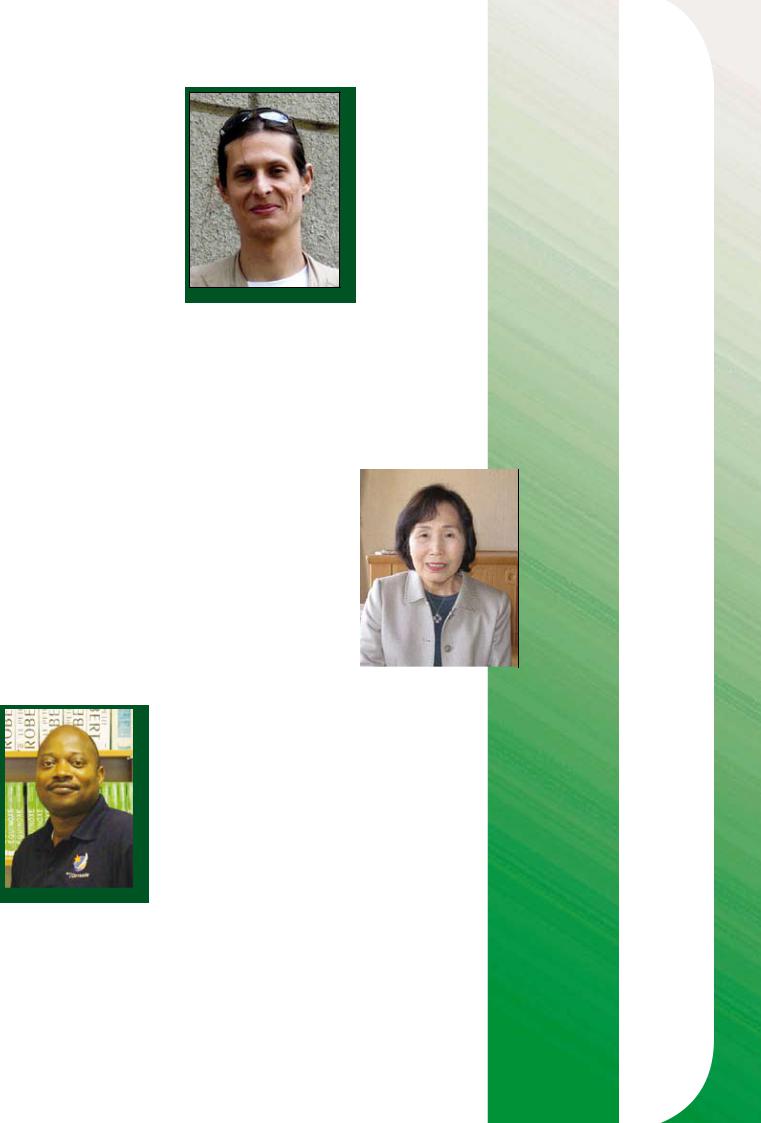
MY MAIN INTEREST IN ESPERANTO LIES WITH ITS CULTURE
Name: Rogener Pavinski
Country: Brazil
Profession: Filmmaker and musician
Esperanto activities include:
Musician in the rock group Supernova
Creator of the film "Esperanto estas..."
TEJO board member
In 2005 I took part in a competition run by TEJO (World Esperanto Youth Organization) and got financial help to travel to the International Youth Convention in Poland. I seized the opportunity and spent a month at four Esperanto events in four different countries. That was an unforgettable adventure for me,
because I'd never travelled abroad before!
My main interest in Esperanto lies with its culture, and as I'd always wanted to create music in Esperanto, I started working on songs with some friends. The result was the creation of a rock group and an album called Supernova, released in 2006 by French record label Vinilkosmo. I also have professional links with Esperanto. One of the most important projects I've undertaken so far has involved collaborating internationally on the documentary Esperanto estas... (Esperanto is...), which I edited. I've also produced a music video for Supernova, and I continue to produce various other short films.
ESPERANTO MAKES ME FEEL LIKE
A TRUE WORLD CITIZEN
Name: Jean Codjo
Country: Canada / Benin
Profession: Teacher
Esperanto activities include:
Member of the African Commission
Editor of the bulletin
Esperanto in Africa
Ilearned Esperanto quite by chance during a political crisis in Benin (1988). At the time, I meant to learn Spanish, but I mistook Esperanto for it. I began to have doubts when I noticed the language was too easy to be Spanish. It was only then that I discovered it was actually an international language. I started by spending a few weeks studying Esperanto on my own; I then corresponded with an Esperantist in the Netherlands to
learn more.
|
For me, Esperanto became another language that I could |
|
|
|||
use to communicate with new friends in different countries, |
|
|
||||
not just with Spanish people. That's how I made friends with |
|
|
||||
people from all over the globe, even those whose native |
|
|
||||
languages I knew absolutely nothing about. In addition, |
|
|
||||
Esperanto has had an effect on my private and professional |
|
|
||||
life – the way I act, the way I think, and the way I relate to |
|
|
||||
other people, regardless of their ethnicity or culture. |
|
|
||||
|
Thanks to Esperanto, I went on to learn German. My very |
|
|
|||
first pen pal was a German girl. Although we wrote to each |
|
|
||||
other in Esperanto, I wanted to know more and more about |
|
|
||||
her language. I also knew that some aspects of Esperanto |
|
|
||||
grammar, especially the -n ending for objects, were similar |
|
|
||||
to German. And the system of making new words by |
|
|
||||
combining existing ones is similar to how German words |
|
Personal |
||||
THANKS TO ESPERANTO I'VE ENJOYED MANY |
|
|||||
are constructed. In the end, I decided to study German to |
|
|
||||
degree level at university. Today I'm a professional language |
|
|
||||
teacher, and German is one of the languages I teach. I've |
|
|
||||
become more tolerant and open to other cultures. Esperanto |
|
|
||||
makes me feel like a true world citizen. |
|
|
||||
CLOSE FRIENDSHIPS ABROAD |
|
about stories |
||||
|
|
|
|
Name: Satoo Reiko |
|
|
|
|
|
|
|
||
|
|
|
|
|
||
|
me greatly and stayed in my |
|
Esperanto |
|||
|
heart for a long time. Some |
|
||||
|
|
|
|
Country: Japan |
|
|
A |
|
|
||||
|
fter the end of the Second World War, my older |
|
|
|||
|
brother learned the Latin alphabet. While my |
|
|
|||
|
mother was supervising his studies, she told me |
|
|
|||
and him about Esperanto, which she'd learned when |
|
|
||||
she was young. For some reason her words impressed |
|
|
||||
42 years later, I read an article about Esperanto in a |
|
|
||||
newspaper. This really interested me because I missed |
|
|
||||
my mother, and it inspired me to join a course that was |
|
|
||||
taking place in the town hall at the time. I plucked up |
|
|
||||
the courage to go to the classroom, and I began studying |
|
|
||||
Esperanto every Wednesday from May to October, |
|
|
||||
except in August. As soon as the course ended, I started |
|
|
||||
corresponding with a Bulgarian woman, and hugely |
|
|
||||
enjoyed it. Not long afterwards, I received an unexpected |
|
|
||||
letter from a Czech woman who wanted to correspond. |
|
|
||||
In 1995, when I travelled to Eastern Europe with my |
|
|
||||
|
|
|||||
husband, I met her and her husband in Prague. I don't |
|
|
||||
have the words to express how moving this was for me. |
|
|
||||
Thanks to Esperanto and its speakers, I've enjoyed many |
|
|
||||
close friendships and pleasant trips abroad. |
|
|
||||
|
|
A FASCINATING LANGUAGE |
13 |
|||
|
|
|
|
|
|
|
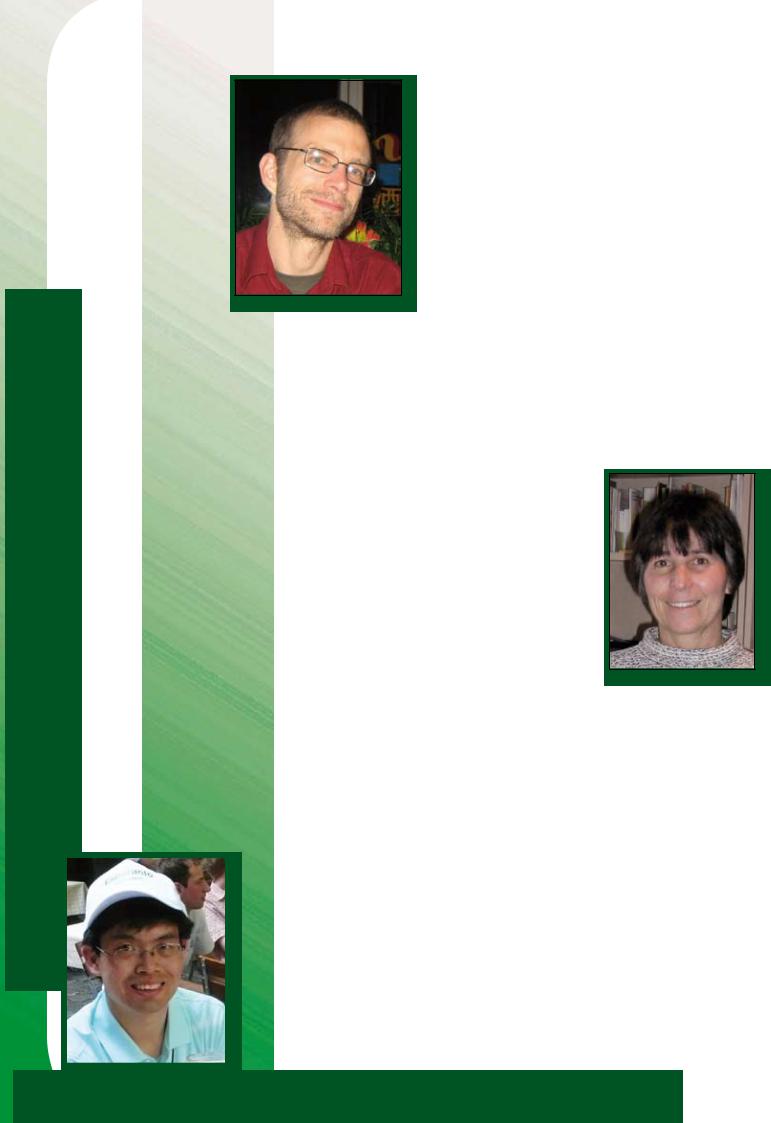
Personal stories about Esperanto
LEARNING ESPERANTO LED ME TO LIVE ON A DIFFERENT CONTINENT
Name: Russ Williams Country: Poland / USA
Professions: Translator and teacher
Esperanto activities include:
Collaborator in lernu.net and other projects
Various translation projects
In April of 2003, on the spur of the moment and along with some colleagues, I decided to learn a constructed language, just for fun. After spending a couple of interesting days with Lojban, two of us thought: "Lojban seems like a very difficult language, and there are probably very few people who actually speak it. Maybe we should look at Esperanto. It's presumably easier and has more speakers." A quick search with Google confirmed this, and inspired me to read about Esperanto's fascinating history, culture, and literature. I realized I was finding Esperanto intriguing as more than just a language with an elegant grammar that was fun to play with. Political events in 2003 were making me think about peace, tolerance, better mutual understanding, international relations, etc. I had the gut feeling that learning Esperanto would be an important decision in my life, but I never imagined it would lead me to live on a different
continent.
To cut a long story short, between 2003 and 2005 I took part in various Esperanto events around the world, got to know a very charming Polish woman, and moved to Wrocław in Poland: Anna and I are now engaged and live together, using Esperanto as our main language at home. I'm learning Polish, which is much more difficult than Esperanto, but my knowledge of Esperanto as a second language helps me learn other languages and gives me confidence in doing so. I'm really happy that my colleagues and I had that jokey conversation about constructed languages back in 2003!
ESPERANTO HAS GIVEN ME FRIENDS
ALL OVER THE WORLD
Name: Li Jianhua
Country: China Profession: Journalist
Esperanto activities include:
Working for the magazine
El popola Ĉinio
(From People's China)
Istarted learning Esperanto at the Communication University of China in the autumn of 2003. A year later, I worked as a volunteer and guide at the 89th World
Convention in Beijing. After graduating from university, I joined the staff of El Popola Ĉinio in July 2005. My work often put me in touch with Esperanto speakers abroad, and those contacts have given me friends all over the world. One of my friends is Povilas Jegorovas from Lithuania, and he invited me to give a talk at the World Conference of Esperanto Journalists in Lithuania's capital, Vilnius. I was delighted: this meant I could experience my first trip abroad and make my first speech in that sort of conference. I was able to take part in the conference thanks to a grant from El Popola Ĉinio. There were two "firsts" for me there: it was the first time I'd spoken with foreign dignitaries (the president of the Lithuanian parliament and the mayor of Vilnius were at the banquet, and I talked to them with the help of Mr Jegorovas), and it was the first time I'd attended the making of a TV programme. I gained a lot of friends at the conference, and a deep sense of friendship. I will never forget that.
I WAS CAPTIVATED BY ESPERANTO'S INTERNAL LOGIC
Name: Zsófia Kóródy Country: Germany / Hungary
Profession: Certified Esperanto teacher
Esperanto activities include:
Board member of the International League of Esperanto Teachers
Director of the Association of German Esperanto Teachers
Istudie d linguistic s at
university in Budapest, and started learning Esperanto simply because I wanted to see how a constructed language works and what it consists of. I was captivated by Esperanto's structure and internal logic. But I wasn't satisfied with merely analysing the language, so I went looking for speakers, to put the language to some use. A new world opened up. I got to know many people – many friends throughout the world
– and with their help I explored foreign countries, cities, cultures, and customs. Later I decided to become an Esperanto teacher, dedicating my life to working to help more and more people discover this wonderful method of interpersonal communication.
I've been teaching several languages, including Esperanto, for over 30 years, in schools and various other courses. It's very interesting to compare the progress of my students, and see how much faster they start to use Esperanto. After just a short time they can hold conversations in the language and make friends in other countries easily.
Since 2003 I've been living and working in the German city of Herzberg am Harz, where my teaching has also contributed to Esperanto becoming an optional part of the school curriculum.
14 DISCOVER ESPERANTO
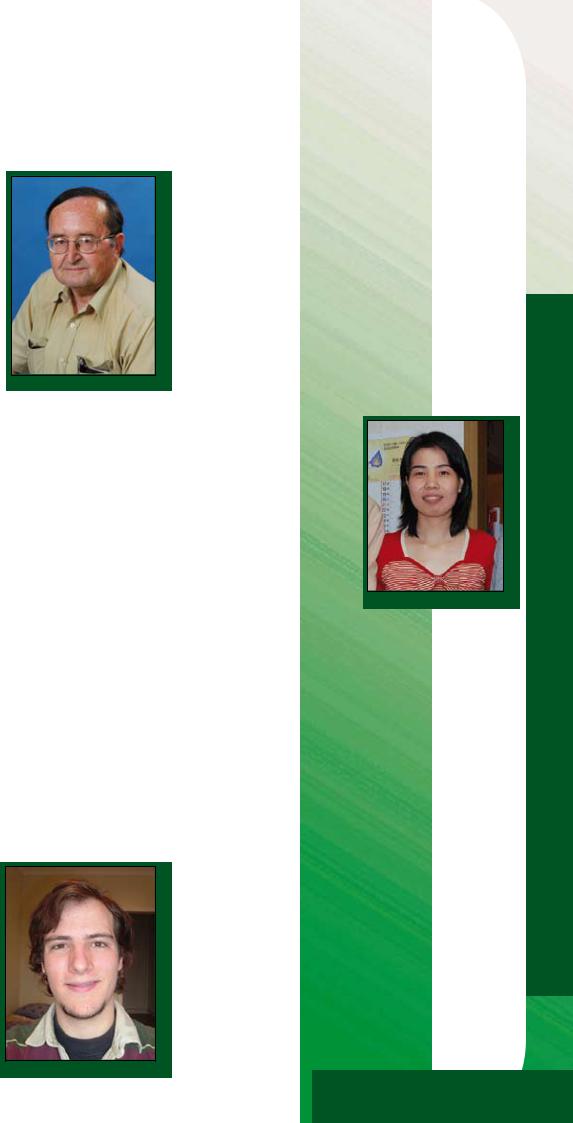
Furthermore, Esperanto has been chosen as the language in which Herzberg communicates with its twin (sister) cities. Because Esperanto can be found in so many aspects of the city's life, in 2006 the council added a nickname: "Herzberg am Harz – the Esperanto city".
ESPERANTO IS PART OF MY NORMAL LIFE
Name: Renato Corsetti
Country: Italy
Profession: Professor of psycholinguistics, retired
Esperanto activities include:
Former president of TEJO and UEA
Member of the Academy of Esperanto
Ilearned Esperanto when I was fairly young, about twenty years old, because I was interested in languages. At that time, I would study Swahili or Urdu simply for
the pleasure of learning other languages. I taught myself Esperanto from a textbook I found somewhere. I studied the other languages superficially, just enough to see how they worked. But I didn't remain an Esperantist because of the language and its amazing features. I remained an Esperantist because of Esperanto's political meaning. All persons and peoples are equal, all cultures have something of value in them, and if you are looking for a truly international language, it's Esperanto.
I later added other elements to my Esperanto life, because I married an English Esperantist, and we always speak Esperanto at home. We have two sons, now grown up, who speak Esperanto as well as Italian and English. So Esperanto is part of my normal life, when we go shopping at the local supermarket or when we're cooking or having fun. I just want to emphasize that my wife and I always speak Esperanto together, even after thirty years of her learning Italian perfectly and me constantly using English for various purposes. We speak Esperanto together simply because it's what feels most natural and best for us.
ESPERANTO HAS REALLY BOOSTED MY INTEREST IN OTHER COUNTRIES AND CULTURES
Name: Marcos Cramer
Country: Germany
Profession: Doctoral student in logic
Esperanto activities include:
Editor of a magazine about the Esperanto youth movement
Contributor to the Esperanto Wikipedia
Ibegan learning Esperanto at the age of sixteen because I was interested in the grammar of a simple constructed language. As soon as I'd started, I became interested in Esperanto's ideals – internationality and equality – which were important factors for me in continuing to study. At first I learned Esperanto from a short textbook, then I used it on the Internet, and after just nine months, I took part in my first event: a week-long international Esperanto youth
meeting where I was able to speak the language well.
I now use Esperanto almost every day on the Internet, where I'm in contact with people on several continents. I also often take part in international youth meetings that use Esperanto, and from time to time I use the hospitality service of Pasporta Servo for low-cost trips and for closer contact with the local population. Esperanto has really boosted my interest in other countries and cultures, as well as my interest in other languages. It was through Esperanto that I met my half-Russian wife, as well as many good friends from different countries.
ESPERANTO HAS SHOWN ME A NEW WAY TO LOOK AT THE WORLD
Name: Trinh Hong Hanh
Country: Vietnam
Profession: Commercial office worker
Esperanto activities include:
Board member of Vietnamese Esperanto Youth Organization
One day, at my best friend's house, I met her neighbour – and she was the first person to tell me about Esperanto. Straight away, lots of questions
popped into my head: "What's the Esperanto language like?", "Whose language is it?", "Is it like English?", "Is it really easy to learn?", and so on. To discover the answers to these questions for myself, I decided to learn Esperanto at the beginners' Esperanto course in Hanoi. The course was given by a competent instructor. Apart from teaching me the language, he also described Esperanto's "inner idea" and gave me the benefit of his rich practical experience of organizing events for the movement. It was he who encouraged us to volunteer to help at the second Asian Esperanto Convention in August 1999, in Hanoi. What a surprise! In just six months of three lessons a week, we learned the language and did everything we could to make the second Asian Esperanto Convention a success. And it was so awesome! Our entire class of beginners became the core of the Vietnamese Esperanto youth movement. Many of my classmates did more than just contribute: they took on the important responsibility of setting up new Esperanto organizations. Esperanto has shown me a new way to look at the world and brought me new understanding. My love for Esperanto and the movement has never stopped growing. I'm really pleased with my progress, and even more so with the progress of our Esperanto youth movement in Vietnam.
Esperanto about stories Personal
A FASCINATING LANGUAGE 15
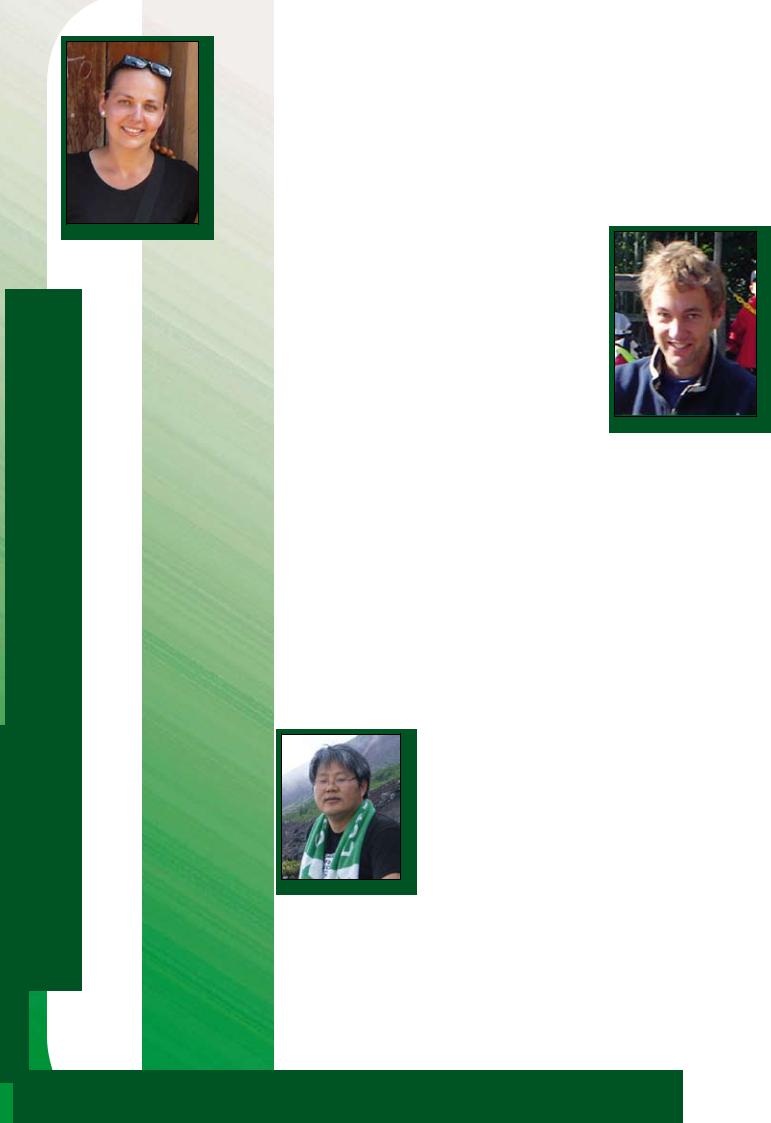
Personal stories about Esperanto
YOU CAN EVEN FIND
ESPERANTO IN VILLAGES
WITH NO ELECTRICITY
Name: Vlaďka Chvátalová
Czech Republic /
Name: Kong Kil-yoon
Country: South Korea
It was purely by chance that I came into contact with Esperanto. One winter, I was watching a TV programme in which an old man was attending a course, learning
Esperanto. The words "Esperanto, international language" interested me, but I quickly forgot all about them. On my first day at university, I came across the word Esperanto again, on a poster that members of the university's Esperanto club had put up to attract new students. So I took part in their course.Once I'd mastered the grammar, I began to correspond with foreign Esperantists. To improve my abilities in Esperanto, I asked a
Japanese Esperantist to correct the mistakes in my letters. She helped me reach a high standard in the language, and she also helped me understand Esperanto's "inner idea". I've now been able to make friends with hundreds of Esperantists around the world, just by using Esperanto. By corresponding and talking with these people, I've discovered what the purpose of Esperanto is. International contacts and relationships are really interesting and Esperanto makes them much easier.
FOR ME ESPERANTO IS A GREAT INSPIRATION
Name: Hokan Lundberg
Country: Sweden
Profession: High school teacher
Esperanto activities include:
One of the founders of E@I and lernu.net
Coordinator of this booklet
Ihad a problem with learning foreign languages at school. I struggled with English and German for many years, but sadly I never got to a good standard. When I was 20, I suddenly felt like learning Esperanto after reading the Danish author Martinus. I had to struggle for several years with Esperanto too, but the difference was that this was a language I felt I could eventually get the hang of, and I gradually reached a high level. You could say I'm proof that someone who has no talent for learning foreign languages can learn Esperanto well. My experiences inspired me to work for the language
in various ways.
For several years I was fully occupied with Esperanto projects, but now I only work on them in my spare time. My wife Sonja is also very fond of Esperanto. We met during a TEJO seminar by the Black Sea in Bulgaria, and since then we've been using Esperanto together. Sonja comes from Serbia and I'm from Sweden, so Esperanto serves as a language bridge between our different backgrounds. She speaks Serbian with our children and I speak Esperanto. They use Swedish at nursery school and in the neighbourhood. This works very well. It's incredible to see how quickly children can switch between different languages depending on who they're talking to.
We decided that I should use Esperanto with our children for two main reasons: 1) To stop their Swedish from becoming too dominant over their Serbian, so that they don't just understand Serbian, but can also use it themselves when we visit grandparents and friends in Serbia. 2) Because my wife and I want to continue using Esperanto together, to keep it as one of our family languages. Another reason is that I really enjoy speaking Esperanto, especially with my loved ones.
jjj
You may have noticed from these stories that various people have found their life partners through Esperanto. Isn't that a sure sign that Esperanto can express feelings and love?
16 DISCOVER ESPERANTO

Zamenhof, Esperanto's founder
As a child, Zamenhof dreamed of ways to bring mankind together in peace. Establishing an international language was one of them, and he never gave up on that dream. In this section, you'll see how he got his idea for a new international language, and how he turned it into reality.
A boy with a great dream
In 1859, a Jewish boy named Ludwik Lejzer Zamenhof was born. He grew up in the small city of Białystok with its mixed population of Poles, Russians, Jews, Germans, and a number of Lithuanians, each group speaking its own language. Zamenhof was quick to note that these ethnic groups did not always get on well with each other, and that their misunderstandings and quarrels often arose from the lack of a
common language. These experiences had a big influence on young Ludoviko (to use the Esperanto form of his name), and when he was still a child, he had a great vision of a common language (alongside the ethnic languages) that all the groups could share. With such a language, places like Białystok would be more peaceful, and people could talk directly to each other to at least try and solve any conflicts before they escalated into serious arguments.
If I hadn't been a Jew from the ghetto, the idea of unifying mankind would either never have entered my head, or at least not dogged me so persistently throughout my entire life.
From a letter Zamenhof wrote in 1905
How about one of the classical languages?
Zamenhof was convinced it would never work if the language of one of the ethnic groups was chosen as the common one, because that could provoke jealousy among the other groups, and give a considerable advantage to the group who used that language natively. At high school, Zamenhof started learning Latin and Greek – the classical languages – and he wondered whether one of those could be used as an international common language. But after studying them for a while, he decided they were too hard to learn, even for him with his knowledge of several other languages: Russian, Polish, Hebrew, Yiddish, German, and French. So how hard would they be for people who didn't have any great interest or experience of learning languages? No, the common international language would have to be easier than the classical languages, but just as politically neutral as them. But did such a language exist?
An "artificial" language
A language that's neutral but also easy to learn. Is that even possible? Learning a language is never an easy task, and is there anything in the world that can be said to be completely neutral? Probably not, but that doesn't rule out the possibility of a language
that's less difficult and biased than the ethnic languages. |
|
|
Zamenhof thought a lot about this, and came to the conclusion |
|
|
that an artificial language was the best solution. By "artificial", |
|
|
he meant that the structure of the language should be designed |
|
|
by one or more people. While he was still in high school, |
Zamenhof, |
|
Zamenhof started experimenting with ways of creating a |
||
about the vocabulary? |
||
new language, but he often doubted whether he could make |
|
|
a good job of it. Despite all his doubts, he stayed true to his |
|
|
dream of a common international language, and he continued |
|
|
experimenting with his "artificial" language, gradually making |
|
|
some progress. |
|
|
Simple grammar, but what |
Esperanto's |
|
(sweet shop, candy store). Both words ended in "-skaya", and |
||
When he learned English at the end of high school, Zamenhof |
|
|
was inspired by how easy its grammar was in comparison to |
|
|
Latin and Greek, and he realized it was possible to have a |
|
|
language with a grammar that was clear and straightforward. |
|
|
He started to simplify the grammar of the language he was |
|
|
building, and after some careful work, he was reasonably |
|
|
happy with it – but the vocabulary just kept on growing! |
|
|
How could he solve this new problem? A language has to |
|
|
have words for just about everything. He came up with the |
|
|
answer when he saw two Russian signs. The words on the signs |
|
|
were "Shveytsarskaya" (porter's lodge) and "Konditerskaya" |
|
|
Zamenhof suddenly grasped how important suffixes could |
founder |
|
be. "I've solved the problem!" he decided, as he stood looking |
||
|
||
at the two Russian signs. Later, he started to make detailed |
|
|
comparisons of words, looking for connections between them, |
|
|
to decide which prefixes and suffixes would be useful in his |
|
|
language. This work proved crucial: Zamenhof managed to |
|
|
dramatically reduce the number of word roots that people |
|
|
would need to memorize. |
|
|
The first draft |
|
At first, Zamenhof tried building words from short groups of letters: a, ab, ac, ad, ... ba, ca, da, ... e, eb, ec, ... be, ce, ... aba, aca, ... But he quickly rejected this idea, because it turned out to be impossible to remember the made-up words. Then he became convinced that the vocabulary should use roots from the Romance and Germanic languages as its basis. That way, his new language would have a natural similarity to European languages. At the end of high school, Zamenhof was able to show his school friends the essentials of a language that he called "Lingwe Uniwersala". Several of his friends were inspired to learn it. In December 1878, they gathered together to celebrate the completion of the first draft of his language. They even sang a hymn in it.
A FASCINATING LANGUAGE 17
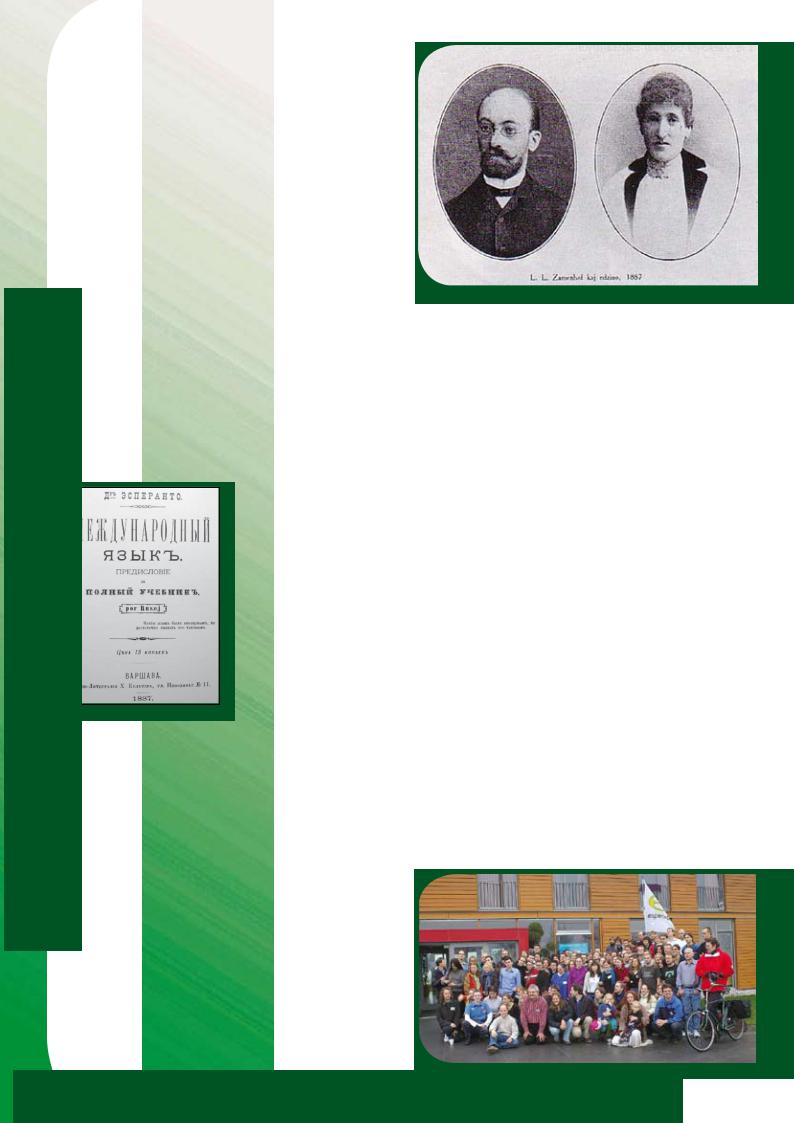
Zamenhof, Esperanto's founder
Testing it and improving it
Zamenhof didn't want to present his language to the public straight away, partly because he was too young to do so, but mainly because he wanted time to test the language carefully and make various improvements. Some of the high school students who had learned "Lingwe Uniwersala" tried to discuss it with adults, but they soon gave up when they found that most people simply laughed at them. Zamenhof decided to continue working on his language project in secret, to avoid such mockery and worse – because Jews at that time were being persecuted for anything and everything. As he tried the language out, making translations of lengthy texts, he noticed certain aspects of the language that needed adjusting (even though they'd seemed fine in theory), and he made constant improvements to the language. He gradually realized he'd be better off avoiding literal translations, and he started thinking directly in the new language instead. At this point, Zamenhof decided that his language had acquired a spirit of its own: it had begun to come alive. That's how the core of modern-day Esperanto was born.
Lingvo internacia
While he was practising medicineinWarsaw,Zamenhof started looking for a publisher to print a booklet about his new language. He prepared a manuscript entitled "Lingvo Internacia" (International Language), but instead of putting his real name on the book, he used the pseudonym "Dr Esperanto". The word "Esperanto" means someone who hopes, and so this was an apt description for the eye
specialist from Białystok – a doctor with hopes for a better world and for unity and peace between its peoples. But he couldn't publish the booklet at first. He had trouble finding a printer who would produce it – and he needed funding, too.
Zamenhof was lucky in more ways than one because he'd just got engaged to Klara Silbernik, who supported his idea of a neutral language. In the summer of 1887, they received financial help from Klara's father, and they used a large part of the money to publish the so-called "Unua Libro" (First Book). This booklet, which was initially printed in Russian and later translated into other languages, included a preface with some poems in Esperanto, a description of the grammar, and a small dictionary. The booklet gradually circulated among idealists and language enthusiasts, initially in Europe, and then in other parts of the world as well.
The next few years were hectic for the newlywed Zamenhofs, involving small children, work, and Esperanto correspondence by night. They weren't rich, but they managed to live in reasonable comfort, and in 1905 they had enough money to
travel to France and take part in the first Esperanto convention, in the city of Boulogne-sur-Mer. There was a wonderful atmosphere among the participants, about 700 in all, from 20 countries. In his opening address, Zamenhof gave an emotional speech about his work and his belief in the unity of mankind. Here's a brief extract:
We should be fully mindful of the great importance of this day, for today we have come together, within the welcoming walls of Boulogne-sur-Mer, not as French with English, nor as Russians with Poles, but as people with people.
A naive dreamer?
Some of Zamenhof's dreams and ideas were naive. For instance, he tried to construct a neutral religious framework that would bring together all believers and freethinkers and make peace between them – but that project never got off the ground, even among Esperanto speakers. While it may be true that Esperanto hasn't taken the world by storm either, it does nonetheless have hundreds of thousands of speakers – perhaps even millions – who admire the language and use it in a wide range of situations. No other language project has blossomed into a language that's actually alive and spoken by people all around the world, in everyday use for global communication and in "international families" (with parents from different countries and language backgrounds). When you look at it from that angle, Zamenhof's language is a resounding success, and as Esperanto speakers we have great respect for him and his creativity. His work has brought us pleasure, inspiration, and friendly ties with people from all over the world.
18 DISCOVER ESPERANTO

The psychology of Esperanto
You can approach the world's language problem by various routes, including politics, linguistics, finance, economics, and so on. Here it's tackled from a psychological angle by psychologist Claude Piron, who also worked as a UN translator for many years.
Esperantists often complain that the world doesn't understand them, that it isn't interested in their point of view, or that Esperanto isn't making fast enough progress. The idea that the language isn't making enough progress is widespread among Esperanto speakers, and it stems from one of the most important features of the human psyche: desire. People want to see Esperanto making progress, and they react to this desire like small children. They don't want to see the size of the hurdles and obstacles that stand in the way of fulfilling
their desire.
So they feel frustrated. When they feel
frustrated, they don't face up to the fact that they were being unrealistic all along, and that the mistake therefore lay with them. Instead, they look for someone else to blame – they blame the rest of the world, which failed to pay them any attention. It's childish, but I'm not being critical when I say that: I'm merely describing part of the normal behaviour of the human psyche. When we have a strong desire, we tend to react childishly.
Language is a very complicated phenomenon
I touched on another psychological aspect of the situation when I said that the world doesn't understand Esperantists. Why doesn't the world understand Esperantists? Because society doesn't really understand the general language situation. Why? There are many reasons. One is that language is a very complicated phenomenon, and complicated things are hard to understand. When something is very complicated, the natural approach is to simplify it. As a result, society in general has a very simplistic picture of the world's language situation. It's more of a sketch than a picture.
There's another psychological reason why society doesn't really understand the language problem, and that's fear. This may surprise you. Indeed, if you go up to a politician, or a linguist, or even a random person in the street, and tell them that fear is one of the reasons the world hasn't solved the language problem, they'll look at you as if you're crazy. For one thing, for them, the language problem simply doesn't exist. "It's already been solved by English, or translators." Furthermore, even if the problem does exist, it has nothing to do with fear. "Nobody's afraid of language," they'll say. "You're talking nonsense." However, many fears are unconscious. We're not aware of them, and that's a good thing, because we wouldn't be able to lead happy lives if we were. But the fact remains that these fears cause many errors and distortions in our understanding of reality.
Why does language evoke fear? Again, there are many reasons. Language is linked to our identity, for instance. At some point
in our childhood, we realize that the people |
|
|
around us are speaking this language as |
|
|
opposed to that one, and this defines us in |
|
|
relation to the rest of the world. I belong to |
|
|
a group of people defined by the language it |
|
|
speaks. Deep in my mind, then, my language |
|
|
is me. The extensive use of the Swiss dialects |
|
|
of German is a way of saying: "This is who |
The |
|
we are – we're not Germans." Or look at how |
||
Flemish and Catalan people react: "Anyone |
||
who persecutes my language or criticizes it, |
||
is persecuting or criticizing me." |
psychology |
|
a flight of fancy. But it's the truth. |
||
Many people have a disparaging attitude |
|
|
to Esperanto because it strikes them as a |
|
|
language that doesn't define a group of people, |
|
|
a language that lacks human identity, and therefore either not a |
|
|
language at all, or at best a language that's artificial rather than |
|
|
natural – one whose similarity to real languages is like that of a |
|
|
robot to a person. And this scares them. They're afraid that this |
|
|
robot, which is said to have worldwide ambitions, will trample |
|
|
all other languages, all ethnic groups, everything that's alive and |
|
|
individual, crushing them out of existence. This may sound like |
|
|
There's a psychological technique known as "clinical |
of |
|
conversation". It explores how ideas and images are associated |
||
|
||
with one another, by asking people to say what passes |
Esperanto |
|
through their minds in response to a certain word. With the |
||
study the documents that get produced in that field, you'll find |
||
word "Esperanto", the technique reveals the presence of this |
|
|
unconscious fear in the minds of a large number of people. |
|
|
Taboo |
|
|
In fact, the whole area of language-based communication |
|
|
between nations and ethnic groups is subject to a taboo. If you |
|
|
that about 99% of them present the facts as if Esperanto didn't |
|
|
exist – as if nobody had ever had any experience of any sort |
|
|
of international communication other than through the usual |
|
|
methods of translation, interpretation, or using a prestigious |
|
|
national language like English. Esperanto is taboo. What proves |
|
|
it's a taboo is the refusal to compare. |
|
|
When scientists want to know the value of something, they |
|
|
always compare it with a reference point. Before deciding on a |
|
|
new medicine, you see how effective it is in comparison with |
|
|
more familiar substances. And when a firm launches some sort |
|
|
of major project, such as building a new stadium, what's the first |
|
|
step? They issue a request for bids. Various companies are asked |
|
|
to submit proposals, and the project's organizers compare the |
|
|
bids and accept the one that's best in terms of cost and all the |
|
|
other relevant criteria. That's the normal procedure. |
|
|
As it happens, there's a whole branch of science devoted to the |
|
|
art of choosing the best way to achieve a specific goal. It's known |
|
A FASCINATING LANGUAGE 19

The psychology of Esperanto
as "operations research" or "quantitative management". If you apply the rules of operations research to the language problem, you find that, out of all the methods that are currently in practical use, Esperanto is the optimal way to achieve the goal.
But to establish this fact, you have to do a comparison between the various methods. You need an objective practical view (from on the ground, as it were) of how Esperanto compares with sign language, or with broken use of a poorly spoken language, or with use of English, or with use of Latin, or with translation of documents and with simultaneous or consecutive interpretation of speech. Such comparisons are the only way to decide what the best system is.
Thousands and thousands of pages have been written about the language situation, sometimes in the UN, sometimes in the EU, and sometimes in university linguistics departments. Even so, very few documents base their discussion of the issues on a comparison that includes Esperanto – you can count them on the fingers of your hands. Comparing all the possible solutions to a problem is such a common activity in other fields; its absence in the field of international language-based communication shows that there's a taboo at work.
Where does the taboo come from?
Why are language issues subject to a taboo? Once again, there are many reasons. Some of them are political. A number of governments disapprove of the idea of "ordinary people" communicating with one another, free from barriers. Some of the reasons are social. That same idea can be unsettling for the privileged social classes, too. People who have mastered English (or another important language) have many advantages over those who only speak local languages – and many of them don't want to lose their advantages. This is particularly true in the Third World.
But I think the main causes of the taboo are psychological. The heart of the matter is the emotional charge in the concept of "language": its weightiness, the mood it evokes, and the fact that it strikes such a deep chord in our souls. We think in concepts and words. And these words and concepts aren't just intellectual
– they tug at our emotions, they elicit certain feelings: not all words, but many of them. If I say "war" or "money" or "mother" or "sex" or "nuclear power", something stirs deep inside you, although you're generally unaware of it. In other words, we're not indifferent in the face of many of our concepts, especially those that are somehow connected to our desires, our needs, our aspirations, our pleasure, our suffering, our influence, etc.
Language is one of those concepts that tends to provoke strong emotional reactions. Why? Because language implies the ability to make yourself understood, and this ability is one of the most basic desires of every human being. If I'm plagued by worries or upset in some other way, then I feel I've been helped if I can talk about it to someone who listens to what I say and reacts with understanding. By sharing my worries or problems with someone else, I no longer feel alone, and I'm better able to cope.
When a baby is upset and crying – often because it doesn't understand what's happening – the adults present sometimes don't react correctly. In fact their only reaction may be to pull a helpless face. But when the child has acquired a language, and can say "My ear hurts", the reactions of the adults are quite
different. True communication takes place, and this changes the child's life. Since communication occurs most often and most effectively with the mother, the child's emotions towards the idea of "language" include its feelings towards her. That's why most languages talk of a "mother tongue", even though it's really a "parent tongue" or "location tongue".
Look how emotional people become when they react to the idea of changing the spelling of their language. Observe the arguments closely, and you'll see there's nothing truly rational about them. It's all to do with emotions – the emotions aroused by the word "language".
Both "father" and "mother"
Esperanto sounds like Frankenstein's monster when people say it was put together by one man. It sounds like it had a "father" but no "mother": the hideous offspring of a twisted loner. This image has been bolstered by definitions of Esperanto in many dictionaries, encyclopedias, language books, and even Esperanto's own publicity materials, which state that "Esperanto was created by Zamenhof in 1887". In fact, Esperanto wasn't created in 1887. What was published in 1887 was the seed of a language that had already spent many years growing and maturing in Zamenhof's head and in his notebooks.
That process took a long time, and it was like the gradual development of a seed within a plant; the project's publication was like the sowing of the seed. But seeds only come alive if they're planted in fertile soil. And that soil was Esperanto's "mother": the community of idealists who first accepted the seed and gave it an environment where it could grow and evolve and flourish into something that was viable enough to survive on its own, independent of any one person.
Esperanto's present form isn't the work of Zamenhof; rather, it's a language that took Zamenhof's project as a basis, and was then evolved over a century of constant use by a wide variety of people. It's a language that has developed quite naturally as a result of everyday usage, literature, and competing innovations, usually unconscious ones. It's certainly not a monstrosity cobbled together by a single person. OK, so it has a "father" – a wonderful father, and one who managed to imbue it with the amazing potential for life that it needed. But it also had a "mother" who lovingly nursed it, and who breathed far more life into it than its "father" alone could have done..
In the long run
As you can see, the psychological aspects of Esperanto – and of the world's language problems – are far more complex than you might initially suspect. Most people's psychological makeup offers strong resistance to the mere idea of an international language that isn't also a national language. That resistance means there's almost no one in the political, social, and intellectual elite who's willing to research the topic calmly.
The resistance will carry on, and it will certainly be harsh, if only because people only appreciate things when they're ready to appreciate them. At the moment, many people simply fail to hear what we say about Esperanto: their minds aren't ready, so what we say goes in one ear and out the other. Yes, there will be strong resistance. But in the long run, in all likelihood, it won't win out over the facts.
(Abridged from a talk given by Claude Piron in 1998.)
20 DISCOVER ESPERANTO
